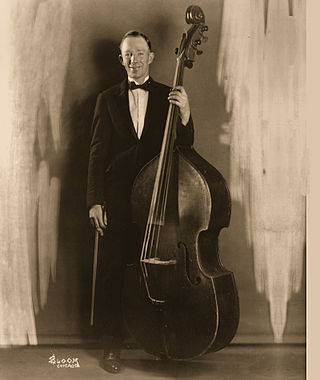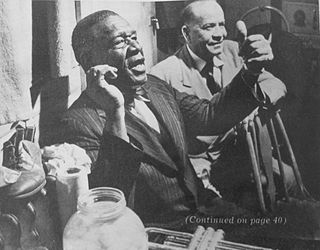Related Research Articles
Wellman Braud was an American jazz upright bassist. His family sometimes spelled their last name "Breaux", pronounced "Bro".

Slapping and popping are ways to produce percussive sounds on a stringed instrument. It is primarily used on the double bass or bass guitar. Slapping on bass guitar involves using the edge of one's knuckle, where it is particularly bony, to quickly strike the string against the fretboard. On bass guitars, this is commonly done with the thumb, while on double bass, the edge of the hand or index finger may be used. Popping refers to pulling the string away from the fretboard and quickly releasing it so it snaps back against the fretboard. On bass guitar, the two techniques are commonly used together in alternation, though either may be used separately.

George Lewis was an American jazz clarinetist who achieved his highest profile in the later decades of his life.

George Murphy "Pops" Foster was an American jazz musician, best known for his vigorous slap bass playing of the string bass. He also played the tuba and trumpet professionally.

Theodore "Steve" Brown was a jazz musician best known for his work on string bass. Like many New Orleans bassists, he played both string bass and tuba professionally.
Kid Thomas (1896–1987), born Thomas Valentine, was an American jazz trumpeter and bandleader.

The Preservation Hall Jazz Band is a New Orleans jazz band founded in New Orleans by tuba player Allan Jaffe in the early 1960s. The band derives its name from Preservation Hall in the French Quarter. In 2005, the Hall's doors were closed for a period of time due to Hurricane Katrina, but the band continued to tour.

Percy Gaston Humphrey was an American jazz trumpeter and bandleader in New Orleans, Louisiana.
Walter Sylvester Page was an American jazz multi-instrumentalist and bandleader, best known for his groundbreaking work as a double bass player with Walter Page's Blue Devils and the Count Basie Orchestra.

Oscar Phillip Celestin better known by stage name Papa Celestin was an American jazz trumpeter and bandleader.

Louis Hall Nelson was an American jazz trombonist.

Jon Marks was a British jazz pianist.
Paul D. "Polo" Barnes was an American jazz clarinetist and saxophonist. He was the brother of Emile Barnes and was a mainstay of the New Orleans jazz scene of the 1920s and 1930s.
Avery "Kid" Howard was an American jazz trumpeter, associated with the New Orleans jazz scene.

Samuel Rimington, is an English jazz reed player. He has been an active New Orleans jazz revivalist since the late 1950s.

Allan Phillip Jaffe was an American jazz tubist and the entrepreneur who, along with his wife Sandra, developed Preservation Hall into a New Orleans jazz tradition.

Wendell Brunious is an American jazz trumpeter and bandleader.

Mark Braud is an American jazz trumpeter and band leader, who is a current leader of the Preservation Hall Jazz Band's New Orleans band, and Mark Braud's Jazz Giants. He has been a sideman for dozens of groups including Harry Connick, Jr., Dr. Michael White's Original Liberty Jazz Band, Henry Butler, and R&B singer Eddie Bo.
Placide Adams was an American jazz double bassist, who worked prolifically with a wide circle of New Orleans jazz stars over his 50-year career.

James Brown Humphrey, also known as "Professor Jim" Humphrey was a musician, bandleader, and music instructor in New Orleans, Louisiana, United States and central figure in the formation of jazz as a contemporary musical art form. Humphrey predates the jazz genre as an active performer and is not himself considered a jazz musician. However, his involvement in the formal training of large numbers of musicians along the southern plantation belt of the Mississippi River delta during the immediate years following the reconstruction era resulted in many virtuoso performers who would go on to originate jazz as a distinct musical genre. Consequently, he is regarded by some in the jazz aficionado community to be "the grandfather of jazz".
References
- 1 2 3 4 5 6 Colin Larkin, ed. (1992). The Guinness Encyclopedia of Popular Music (First ed.). Guinness Publishing. p. 2770. ISBN 0-85112-939-0.
- 1 2 3 4 5 6 7 8 9 "Chester Zardis Songs, Albums, Reviews, Bio & More". AllMusic . Retrieved 19 October 2021.
- ↑ "Dictionary of Louisiana Biography - Z". Lahistory.org. Retrieved 19 October 2021.